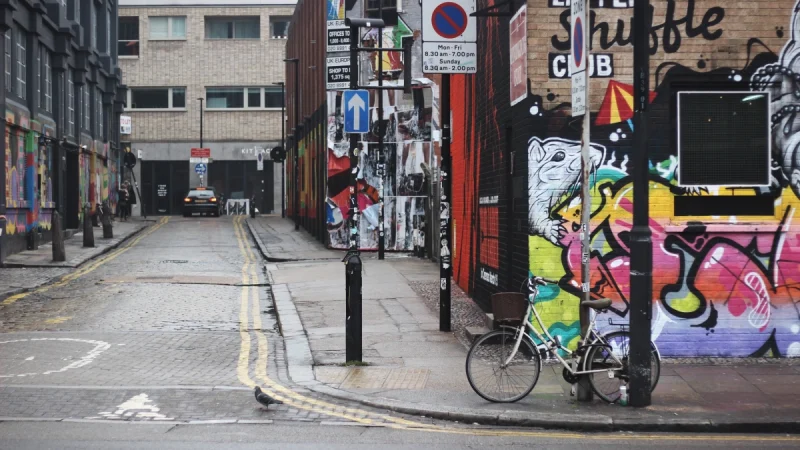Once known for its industrial roots and working-class neighborhoods, East London has evolved into one of the capital’s most dynamic and diverse areas. From bustling markets and art-covered alleyways to hipster cafés and historic architecture, every East London street tells a story.
In this guide, we’ll explore the most famous, vibrant, and culturally rich streets in East London — whether you’re visiting, relocating, or simply curious about this fascinating part of the city.
What Defines an East London Street?
“East London street” typically refers to roads, lanes, and walkways found in the eastern boroughs of London, including:
- Shoreditch (Hackney)
- Bethnal Green
- Whitechapel
- Stratford
- Spitalfields
- Hackney Wick
- Walthamstow
These streets are famous for urban art, historic pubs, diverse communities, and a mix of old and new London. Once gritty, many East London streets are now centers of fashion, tech, food, and nightlife.
Most Famous East London Streets to Visit
Brick Lane (Shoreditch / Whitechapel)
One of the most iconic East London streets, known for:
- Street art (including Banksy and Stik)
- Curry houses and Bangladeshi culture
- Vintage shops, record stores, and weekend markets
- Beigel Bake — a 24-hour salt beef institution
Best for: Art lovers, foodies, and culture seekers
Columbia Road (Bethnal Green)
Famous for the Columbia Road Flower Market on Sundays.
- Independent galleries and boutiques
- Traditional pubs and cafés
- Victorian terraced charm
Best for: Weekend market-goers and Instagram-worthy strolls
Broadway Market (London Fields)
Trendy, community-focused street near the Regents Canal.
- Artisan food stalls and local produce (Saturdays)
- Craft beer bars and bookstores
- A local vibe with vintage flair
Best for: Creative professionals and laid-back locals
Hackney Wick Streets
Once industrial, now a creative haven.
- Murals and graffiti under railway bridges
- Canal-side bars and breweries
- Pop-up galleries and warehouse studios
Best for: Artists, photographers, and underground events
Mare Street (Hackney Central)
A central artery of Hackney offering:
- Hackney Empire (historic theatre)
- Hackney Picturehouse
- Trendy cafés and coworking spaces
Best for: Cultural events and local living
Roman Road (Bow)
A traditional East End street with strong local character.
- Roman Road Market (Tues, Thurs, Sat)
- Family-run bakeries and hardware stores
- Nearby Victoria Park
Best for: Old-school market life and East End heritage
History of East London Streets
East London streets have long been associated with:
- Immigrant communities (Jewish, Bangladeshi, Somali, and more)
- Working-class industry (docks, railways, factories)
- Rebellious culture — birthplace of grime, punk, and street art
- Urban renewal, gentrification, and creative regeneration
From Jack the Ripper’s Whitechapel to the 2012 Olympic transformation of Stratford, East London’s streets have always been at the heart of social and urban change.
Living on an East London Street
East London is a popular place to live for young professionals, students, creatives, and families.
Pros:
- Excellent transport links (Overground, DLR, Tube)
- Affordable(ish) compared to Central or West London
- Thriving local food scenes and nightlife
- Diverse schools, shops, and amenities
Cons:
- Some areas still experience urban challenges
- Gentrification has increased rents in hotspots like Shoreditch and Hackney
Tip: Streets around Leyton, Walthamstow, and Clapton offer more space and value compared to inner zones.
Instagram-Worthy East London Streets
| Street Name | Known For |
| Fashion Street | Street art, murals, and photoshoots |
| Princelet Street | Georgian townhouses & film backdrops |
| Cambridge Heath Road | Retro signs and East End character |
| Fournier Street | Huguenot architecture and history |
| Ridley Road | African-Caribbean market culture |
Pro tip: Early mornings or golden hour are perfect for urban photography.
Getting Around East London Streets
- London Overground – Connects Hackney, Shoreditch, Dalston
- Central, District & Jubilee Lines – Key access to Stratford, Bow, Mile End
- Buses – Frequent and affordable for exploring every street
- Walking & Cycling – Many areas are walkable and bike-friendly
The Cycle Superhighways and Regent’s Canal paths provide beautiful alternative routes across East London.
Conclusion
From the vintage vibes of Columbia Road to the electric creativity of Hackney Wick, every East London street offers something unique. It’s where tradition meets innovation, culture meets counterculture, and everyday life meets artistic expression.
Ready to explore? Walk, eat, shop, and snap your way through East London’s unforgettable streets — each one a chapter in London’s ever-evolving story.
FAQs
1. What is the most famous street in East London?
Brick Lane is arguably the most famous East London street, known for its street art, cultural diversity, and food scene.
2. Is East London safe to explore on foot?
Yes. Most East London streets are safe and well-populated, especially during the day. As with any city, stay aware of your surroundings.
3. Where can I find the best street food in East London?
Try Broadway Market, Brick Lane Market, and Netil Market for a mix of global street food and local flavors.
4. Which East London streets are good for shopping?
Visit Columbia Road for flowers and art, Roman Road for traditional markets, and Spitalfields for designer brands and indie fashion.
5. Is there street art on every East London street?
While not every street has art, many areas like Shoreditch, Hackney Wick, and Whitechapel feature world-class murals and graffiti.
Also read: Places to See in South Wales: Top Attractions for Nature, History & Culture









